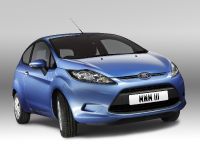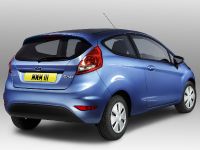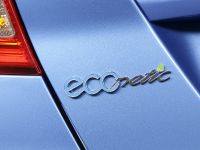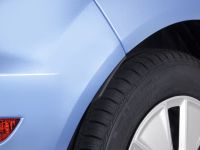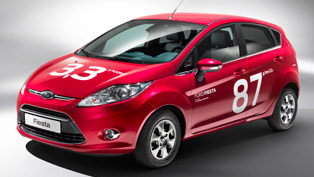Three Econetic Ford Fiestas will Compete in the Monte-Carlo Rally
Now in its third consecutive year, the Monte-Carlo Rally for Alternative Energy Vehicles accepts only the most innovative environmentally friendly vehicles. The Ford Fiesta ECOnetic has been entered in the class for fossil-fuel-powered cars with emissions lower than 120 grams of CO2 per kilometre. With emissions of 98g/km and fuel consumption of 3.7l/100 km (mixed cycle), the Fiesta ECOnetic is well placed to perform strongly in this forward-thinking competition.
The Monte-Carlo Rally for AEVs is the first round of the FIA Alternative Energies Cup, which is dedicated to this type of vehicle. The Ford Fiesta ECOnetic is entered in a particularly hotly contested class of 28 cars from 9 different manufacturers! The Ford Fiesta ECOnetic will draw on its excellent balance of performance and fuel consumption. It has the lowest emissions in its segment but still develops 90bhp, accelerates from 0-100kph in 12.3s and can reach a top speed 178kph on track.
This exceptional efficiency underlines the progress of Ford's research and development programmes for environmentally friendly vehicles.
The Ford Fiesta ECOnetic has been entered in this new-style Monte-Carlo Rally under the banner of Drive Classic, a private team based near Paris. Two cars will be entrusted to the experienced crews of Alain Jongerlynck – "Greg" (2nd in 2008) and Pascal Aimé – Stéphanie Aimé (3rd and winner of the overall regularity standings). A third Fiesta will be driven by journalist Gaël Briançeau, from Automobile Magazine.
Alain Jongerlynck competed 12 times in the Monte-Carlo Rally and has the same number of Monte-Carlo Historics (for classic cars) to his name. Nicknamed "Bilou", he now runs Drive Classic and has become an ardent specialist of the "ecological" Monte-Carlo Rally.
"The Monte-Carlo Rally for Alternative Energy Vehicles is particularly demanding, both in terms of driving and strategy – that's what makes it so interesting," he enthuses. "On the timed stages, the challenge is to maintain the average speed that you've been allocated while consuming as little fuel as possible – and the results take both parameters into account. The average speed must be constant from the start to finish of the timed sector, so you need to be quick through even the most difficult sections. It means you can't take any short cuts with the car: you need excellent handling as well as exemplary fuel consumption. From this point of view, the Ford Fiesta ECOnetic has some real strong suits. The chassis is very good and, with 20.4mkg of torque available at 1750 rpm, it accelerates well without penalising the fuel consumption. We'll be trying to fly the Ford colours at the front of the field but it will be an exciting battle because we've got some strong competition this year."
Following the usual technical and administrative checks, the 3rd Monte-Carlo Rally for AEVs will begin on Friday March 27. The first challenge will be a Concentration stage that starts simultaneously from two different cities, Lugano and Clermont-Ferrand. The finish will be on Sunday March 29 on the Monaco harbourside.
A SUMMARY OF THE FORD FIESTA ECONETIC
The Fiesta ECOnetic is powered by a special version of the 1.6l 90bhp TDCi Duratorq engine, equipped with a particulate filter. Compared to the previous generation of Fiesta 1.6l TDCi, the ECOnetic version uses 160 litres less fuel over 20,000km. In the extra-urban cycle, it can cover 100km on just 3.7l of fuel.
Like with the other models in Ford's ECOnetic range; optimised aerodynamics, low rolling resistance tyres and enhanced lubrication help reduce both the fuel consumption and the consequent CO2 emissions. Lower ride height, coupled with aerodynamic tweaks such as wheel covers and wheel deflectors, improve the Fiesta's already streamlined drag coefficient (Cx: 0.33).
Low rolling resistance 175/65 R14 tyres, a longer final drive and special lubricants (developed with BP) all improve energy efficiency, particularly on motorways.
The Fiesta ECOnetic achieves this first-rate efficiency without sacrificing the driving enjoyment, style or practicality that are the Fiesta's hallmarks.
The ECOnetic version of the new Fiesta is not the only car to benefit from Ford's work on sustainability. Every new Fiesta is fitted with Electric Power Assist Steering (EPAS), which uses less fuel and engine power than traditional hydraulic power steering.
High-strength steels, coupled with a weight saving of 40kg compared to the previous model, also help improve energy efficiency – despite improved safety equipment and sound insulation.
Ford's commitment to sustainability influenced the development of the Fiesta and the working practices of the manufacturing facilities. Ford's diesel centre of excellence at Dagenham in Great Britain, which produces the Duratorq TDCi engines, generates all of its electricity from renewable sources thanks to two wind turbines – with plans for a third.
Ford also uses electricity from renewable sources to cover the requirements of the Fiesta manufacturing facilities and its engineering centre in Cologne, Germany. This programme will help Ford to reduce its CO2 emissions by 190,000 tonnes annually.
